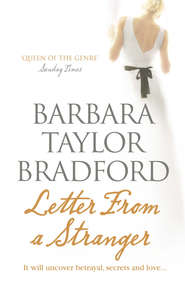По всем вопросам обращайтесь на: info@litportal.ru
(©) 2003-2025.
✖
The Emma Harte 7-Book Collection: A Woman of Substance, Hold the Dream, To Be the Best, Emma’s Secret, Unexpected Blessings, Just Rewards, Breaking the Rules
Настройки чтения
Размер шрифта
Высота строк
Поля
‘Ah, yes. I have them all now, Emma. Everything has been sold and the prices were very good. Excellent, in fact. We realized just under nine million pounds. Not bad, eh?’
‘That’s marvellous, Henry! Where is the money?’
‘Why, right here in the bank. Where did you think it was, my dear?’ He sounded startled, even a little affronted, and Emma smiled to herself.
‘I know it’s in the bank, Henry, but which account is it deposited in?’ she asked patiently.
‘I placed it in your own private business account, E.H. Incorporated.’
‘Please transfer it today, Henry. To my current account. My personal current account.’
It was obvious to Emma that Henry was astounded. There was a silence for a few seconds and she heard him sucking in his breath. When he found his voice at last he said, ‘Emma, that’s ridiculous! Nobody puts nearly nine million pounds in a personal current account. You’ve got about two hundred thousand pounds in that account anyway. Look here, I know you said you needed about six million pounds for some personal project, but the remainder of the money from the sales should be working for you.’
‘I don’t want it working for me, Henry. I want it in my current account.’ She laughed and could not resist teasing him a little. ‘I might want to go shopping, Henry.’
‘Shopping!’ he exploded. ‘Come now, Emma! Not even you can spend that amount shopping! That’s the most ridiculous thing I’ve heard you say in all the years I’ve known you.’ He was furious.
‘I certainly can spend that amount of money shopping, Henry, depending, of course, on what exactly I’m buying,’ Emma said acidly, thinking to herself that Henry’s marvellous sense of humour always seemed to evaporate into thin air when he was discussing money. ‘Please, Henry, no more discussion. Deduct the bank’s fee for handling the sales, and the taxes to be paid, and put the rest in my personal current account.’
He sighed in exasperation. ‘Very well. I suppose you know what you’re doing. After all, it is your money, Emma.’
You’re damn right it is, Emma thought.
Emma worked on her seating plan for the family dinner on Saturday night and prepared a suggested menu for Hilda. Then, after locking the legal documents in her briefcase, she went into her bedroom to rest. It was going to be an extremely difficult weekend, of that she was absolutely sure. Yet she felt no apprehension or the slightest twinge of anxiety, simply a cold detachment and a natural distaste as she envisioned the scenes which were bound to ensue after the family dinner on Saturday night.
She had an abhorrence of scenes, which in their inherent violence and futility both repelled and irritated her, and she tried to avoid them at all cost, particularly with her children. In spite of her reassurances to Paula, she knew that a few altercations would be an inevitability during the next few days. She accepted this fact with resignation and steeled herself in preparation. She was not sure whether any of her children, other than Daisy, had lately developed enough inner strength to help them withstand a sudden crisis with a degree of fortitude. If they had, it would be a staggering surprise to her, but she would welcome this development because it might conceivably alleviate some of the unpleasantness. At the same time, she did not have to speculate on how they would at first respond to her news.
Emma understood all of them well enough to anticipate and gauge their reactions. Apart from Daisy, who was not involved, each one of them would, in turn, be shocked and infuriated by the news she would impart. She realized she was going to strike a swift and terrible blow, a blow which would affect all of their lives. But she felt no disquiet or pity, for it would be a blow from the sword they had forced her to take up and wield in defence, through their own foolhardy self-interest and avariciousness.
Neither did she suffer feelings of guilt about the innumerable plans she had made for the future. And she certainly did not have one iota of compassion for those who would be the most badly affected. There was only a heartbreaking sadness buried inside her that at times felt like a constricting steel band around her chest. It was a sadness that sprang from her hurt and her disappointment in her children, and from a chilling horror at the knowledge that they had cold-bloodedly plotted against her. Years ago Emma had ceased to expect their love and she no longer sought their approbation but, in spite of that, she had never imagined she would have reason to question their loyalty at any time. The devastating implications of their scheming had at first left her thunderstruck, but this initial reaction had rapidly been replaced by a numbing anger and finally she had felt only pure contempt. She smiled grimly as she reflected on their duplicity, a duplicity so ill-conceived and lacking in skill and imagination that she had known about it from its very inception.
At least she could have had a degree of respect for them if they had been less transparent and a little more adroit in their plotting. Emma had always had the ability to stand back and admire a strong and cunning adversary, however grudging that admiration was. As far as her children were concerned, she was appalled at their lack of judgement, and their ingenuousness, which had precipitated their reckless and fatal actions and which had apparently led them to underestimate her.
She frowned and turned her thoughts away from the dissident members of her family, focusing her love on Daisy, Paula, and all of her other grandchildren. Eventually the quiet calm was restored and she slept, a deep untroubled sleep.
Afternoon tea had been a ritual at Pennistone Royal for years. It was a ritual Emma enjoyed, but even if she had not, Hilda would have not permitted it to be abandoned. ‘Over my dead body, madame,’ she had cried when Emma had suggested forgoing it a few years ago. Emma had shrugged and laughed helplessly. Hilda was a local woman who had come to work for Emma just after she had bought and restored Pennistone Royal and she was more like a member of the family than a paid servant. She was devoted to Emma, whom she described to anyone who would listen as ‘a good simple woman, with no fancy ideas’, adding with typical bluntness, ‘and a real lady whatever her beginnings were. More so than many who were born such, I can tell you!’ Emma was already a legend in the area, not only because of her power and wealth but for the many charitable deeds she had performed, quietly, with no fanfare and no desire for accolades, as was her way. But whenever Hilda had the opportunity she would proudly enumerate all of Emma’s good works yet again like a litany, not forgetting to mention that her Madame had put her own son Peter through university and had created a series of scholarships for the talented children of Pennistone and Fairley. ‘And what about her Foundation,’ she would continue, with a sniff, arching her neck and narrowing her eyes shrewdly. ‘Now, the Foundation gives away more money than I care to mention. Millions! Yes, millions. There is nothing tight-fisted about Emma Harte, that’s the truth. Which is more than I can say about some of the other rich folk around here. They wouldn’t give a blind man a light on a rainy night, never mind part with a few coppers for the needy.’ And when she wasn’t singing the praises of Emma she was proclaiming the virtues of Paula, whom she had helped to raise and whom she loved just as much as if she were her own daughter.
And so, promptly at four o’clock, Hilda came sailing into the parlour, carrying before her a great silver tea tray set with a beautiful Georgian silver tea service of exquisite design and delicate china which was translucent when held to the light. Following in her wake was one of the two young maids who came daily to work at the house, who also carried another gargantuan tray, this one laden with food painstakingly prepared by the cook.
‘Put that on the desk for a minute, Brenda,’ Hilda instructed, ‘and bring one of the small tables over here by the fire to hold it.’ She put her own tray down on the butler’s table and, puffing and blowing from exertion, she paused to catch her breath, motioning to Brenda where to position the second table for convenience. The two women carefully arranged the trays in front of the fire and then Brenda slipped out of the room, leaving Hilda to make the finishing touches. She surveyed Cook’s handiwork critically and then a smile of gratification slowly spread itself across her plump rosy face. There were hot buttered scones, thin slices of bread and butter, homemade strawberry jam, clotted cream, wafer-like sandwiches of cucumber, tomatoes, and smoked salmon, sweet biscuits, and a fruit cake decorated on the top with almonds. It was a real old-fashioned Yorkshire tea. Hilda carefully folded the fine lawn serviettes, put one on each plate with a small pearl-handled silver knife and fork, threw logs on to the fire, plumped the cushions, and then looked around. When she had reassured herself that everything was to her satisfaction she knocked on Emma’s bedroom door.
‘Are you awake, madame?’
‘Yes, Hilda. Come in,’ Emma called.
Hilda opened the door and poked her head around it, smiling. ‘Tea is ready!’ she announced. ‘And Miss Paula is back from her ride. She said to tell you she’ll be here in a few minutes. She’s changing out of her riding clothes.’
‘Thank you, Hilda. I’ll be there shortly.’
‘Ring if you need anything, madame,’ Hilda added, and then went down to the kitchen to have her own tea and give a word of praise to Cook.
When Paula came in a little while later she stood in the doorway and caught her breath, unexpectedly moved by the beauty of the parlour. It was hushed and still, as if time had passed it by. The only sound was the crackling of the fire that burned in the huge hearth. Sunshine filtered in through the tall leaded windows, dusky and golden, bathing the furniture and paintings in a mellow light, and the air, heavy with the perfume of hyacinths and spring flowers, flowed around her, enveloping her in its heady fragrance. There was something poignant about this great old room. Memories stirred within her, faintly elusive and nostalgic. She glided silently across the floor, almost afraid to move within that stillness, fearful that the rustling of her dress might disrupt and destroy that gentle peace. She sank on to one of the sofas and her eyes roamed around the room. Here it was easy to forget that there was a world outside, a world full of pain and ugliness and despair. She drifted gently on the edge of memory, recalling her childhood in this ancient place, the happy times she had spent here with her mother and father, her cousins and her young friends. And Grandy. Always Grandy. Her grandmother was never far away, always there to wipe away her tears, laugh at her childish pranks, admire her small achievements and to scold and cosset and love her. Her grandmother had made her what she was. It was Grandy who had told her she was clever and beautiful and special. Unique, she had said. It was Grandy who had given her inner security and confidence and strength, who had taught her to face the truth without fear and with a courageous heart …
She did not hear Emma come in, so soft was her step. Emma, too, paused to admire, but her attention was focused solely on Paula. How lovely she looks, Emma thought, like a figure from some old painting, remote and wistful, the maiden with the unicorn.
‘There you are, darling!’ Emma exclaimed. ‘You’re looking beautiful and refreshed after your ride.’
Paula glanced up swiftly, momentarily startled. ‘Oh, Grandy, you made me jump. I was miles away.’
As Emma seated herself opposite Paula her eyes lighted on the tea tray. ‘My goodness, look at all this food. Hilda is too much,’ she murmured, shaking her head in mild exasperation. ‘How can we eat all this! It’s only a few hours to dinner.’
Paula laughed. ‘I know! Perhaps she feels you need building up. You know how she fusses over you. But she’s really gone to town today. It’s like the nursery teas she used to make when I was small.’
‘I’m not hungry at all,’ Emma murmured, ‘and she’s going to be so hurt if we don’t eat anything.’
‘I’m ravenous, so don’t worry,’ Paula remarked, picking up a sandwich. ‘It was cold up there on the moors and I rode for miles. It’s given me quite an appetite.’ She bit into the sandwich as Emma looked on approvingly.
‘I’m glad to see you eating for once. You always seem to pick at your food. No wonder you’re so thin …’
The telephone on Emma’s desk rang. Paula jumped up. ‘Don’t disturb yourself, darling,’ she said, dashing across the room, ‘it’s probably only one of the family.’
She picked up the phone. ‘Yes, Hilda. I’ll take it. Hello? It’s Paula. Do you want to speak to Grandmother?’ She listened briefly and said, ‘Oh, all right. Yes. Fine. Goodbye.’ Paula came back to her place on the sofa. ‘It was Aunt Elizabeth. She’s coming tomorrow morning and bringing the twins … and the husband!’
‘So now we know,’ Emma remarked with a chuckle. The telephone rang again. ‘Oh dear, I do hope they’re not all going to call and tell us when they are arriving. This could go on for the rest of the day,’ Emma exclaimed impatiently.
Paula hurried across the room and took the call, which as always was monitored first by Hilda. ‘Emily! How are you?’ she cried when she heard her cousin’s voice. They were close friends. ‘Yes, of course you can. She’s right here.’ Paula put the phone down on the desk and motioned to Emma. ‘It’s Emily, Grandy, she wants to talk to you.’
‘Knowing Emily, this could be quite an involved conversation,’ Emma said with a smile, and picking up her cup of tea, she took it with her to the desk. Sitting down, she lifted the phone and said briskly, ‘Hello, darling. How are …’
‘I’m fine, Grandmother,’ Emily interrupted in her young breathy voice, in a tremendous rush as always. ‘I can’t talk long! I’m in a frightful hurry! But I just wanted to tell you that Sarah is flying up from London this afternoon. I’m going to pick her up at Yeadon airport at six-thirty, so we’ll definitely be there for dinner. Oh, and Alexander said to tell you he might be late. Uncle Kit’s being truculent about that machinery. He’s had Alexander going over all the figures again. Alexander’s furious! Well, anyway, he thinks he can be at Pennistone by eight o’clock, if that isn’t too late. Also, Jonathan is taking the train up from London to Leeds. But he said not to send Smithers. He’ll get a taxi.’
All of this had issued forth in a steady uninterrupted stream, in Emily’s typical fashion, which Emma was quite accustomed to. She sat back comfortably, an amused glint in her eyes, listening attentively, occasionally sipping her tea. Emily was always pressed for time, even more so than she was herself, and it often occurred to Emma that her voluble and volatile young grand-daughter seemed to speak in a series of exclamation marks. Now she said teasingly, ‘For someone in a rush this seems to be a very long conversation, Emily dear.’
‘Grandy! Don’t be mean! I can’t help it if all your idiot grandchildren make me the repository of their messages. Ooh! I’ve one more. Philip is going to try and come with me; if not, he’ll drive over with Alexander. Grandy dear …’ Emily paused and her voice dropped, was suddenly soft and full of lilting charm. ‘Can I ask a favour?’
‘Of course, darling,’ Emma replied, repressing an amused but loving smile. She knew that cajoling tone of Emily’s only too well, adopted whenever she wanted something.
‘Could I borrow one of your evening dresses, please? I only brought a few things when I came up to Bradford last week. I didn’t know you would be giving a big family party. I’ve nothing to wear. I looked through the store here today and everything is so dowdy! And I simply don’t have time to go over to the Leeds store.’
Emma laughed. ‘If you think the clothes in the store are dowdy, I don’t know what you’ll find here, dear,’ she remarked, wondering what on earth a pretty twenty-one-year-old blonde dynamo could possibly find suitable in her wardrobe.
‘That red chiffon dress! The one from Paris! It fits me. So do the red silk shoes,’ Emily rushed on excitedly. ‘I knew you wouldn’t mind me trying it on, so I did last weekend when I was at Pennistone. It looks super on me, Grandy. Please, can I borrow it? I’ll be careful.’
‘I’d forgotten about that dress, Emily. Of course you can wear it, if you wish. I don’t know why I ever bought it in the first place. Perhaps you’d like to keep it,’ Emma suggested generously.
Emily sucked in her breath in delighted surprise but said, ‘Oh, Grandy darling, I couldn’t do that!’ There was another little pause. ‘Don’t you want it, Grandmother?’
Emma smiled to herself. ‘Not really, Emily. It’s far too dashing for me. It’s yours.’











